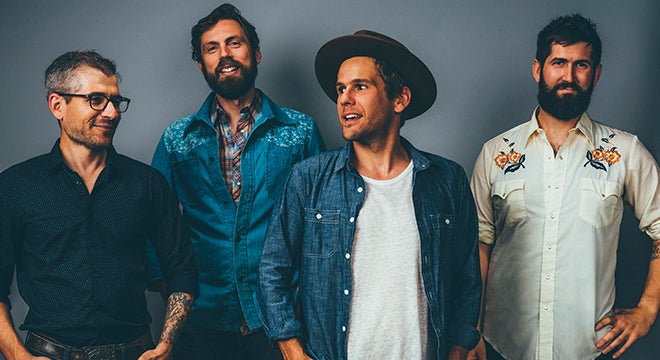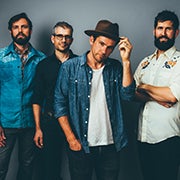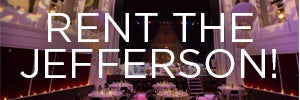
The Steel Wheels - 'Wild As We Came Here' Release Show
The Steel Wheels - 'Wild As We Came Here' Release Show
with Scott Miller
“Few groups have come as far in such a short period of time as The Steel Wheels…” – NPR’s Mountain Stage
“What sets The Steel Wheels from the Blue Ridge Mountains of Virginia apart from many bands is the combination of their stellar instrumentals, accentuated by the one of a kind lead vocal of [Trent] Wagler, and keenly supported by strong harmonies. Eric Brubaker on fiddle, Jay Lapp on mandolin, and Brian Dickel on bass weave in and out intricately throughout this record, painting vivid imagery which flows effortlessly, just teasing the lyrics enough to allow them to resonate within you.” - Country Standard Time
Wild As We Came Here, 2017
Hailing from the Blue Ridge Mountains of Virginia, The Steel Wheels are familiar with the traditions of folk music and how a string band is supposed to sound. In fact, they’ve been drawing on those steadfast traditions for more than a decade. Yet their name also evokes a sense of forward motion, which is clearly reflected in their latest album, Wild As We Came Here.
“I think we’ve always been able to write new songs with different landscapes. However it was really enjoyable for us, creatively and artistically, to depart from the straight-up acoustic sound that we’ve been known for,” says Trent Wagler, who plays guitar and banjo in the band and writes most of the material. “I’m excited to see what happens. There are fans out there who are ready for this and who have been waiting for us to do this.”
While on tour supporting Josh Ritter, the band forged a friendship with Sam Kassirer, who plays keyboards for Ritter on tour and has produced a number of his albums. While The Steel Wheels had been considering other producers and maybe recording in Nashville, they chose to follow their instincts all the way to rural Maine, where Kassirer owns a recording studio inside a renovated farmhouse from the 18th century. All four band members – Wagler, Eric Brubaker (fiddle), Brian Dickel (upright bass), and Jay Lapp (mandolin) – hunkered down for a week and a half to create Wild As We Came Here.
“It’s a gorgeous set-up,” Wagler says. “I didn’t grow up in a big city and I never made a record in a big city. It’s much more my style, and our style as a band, to completely hole up – probably more than we ever have – for 10 full days in Maine. I left the house for a couple of bike rides but I never went to a restaurant or a store the whole time I was there. We ate on site, we slept on site, and we recorded. It was a very immersive experience, top to bottom.”
Afternoon hikes amid the fall foliage helped them clear their heads, ensuring that everyone could stay focused on the task at hand – which in retrospect was quite daunting. The Steel Wheels had about 40 original songs stowed away before the sessions. Only two or three had ever been played live and the band had not arranged any of them.
“One of my favorite parts of the process was taking the first couple of days to rehearse and arrange the songs all in one room, with Sam offering his insights,” Brubaker says. “We had enough time to really build the songs from the ground up, examining each one to see what elements would best highlight the mood we were trying to capture.”
Wild As We Came Here is a significant leap for the band, which started its journey in 2004. Wagler, Dickel, and Brubaker studied at Eastern Mennonite University in Harrisonburg, Virginia, about an hour from Charlottesville. (All four members of the band grew up in Mennonite families.) Wagler and Dickel were in a punk/alternative band until acoustic music lured them in.
Wagler soon started crafting songs and learned flat-picking. Dickel took classes on building guitars. They briefly played as a duo before Brubaker joined on fiddle. Lapp eventually came on board after getting to know the band from the local folk circuit. In 2010, following a variety of EPs and LPs, the ensemble officially branded itself as The Steel Wheels, a tip of the hat to steam-powered trains, industrial progress, and the buggies of their Mennonite lineage.
Lapp says, “We found we really enjoyed singing and playing music together and it happened so naturally. To make it even better, everyone listens very well to what the other is playing, making it a total group experience. I've never worked with such a collected and well-spoken group of men, and it makes the experience of touring and performing a pure joy.”
Then as now, The Steel Wheels’ style weaves through Americana and bluegrass music, folk and old-time music, and the acoustic poetry of the finest singer-songwriters. By incorporating percussion and keyboards into the sessions for the first time, Wild As We Came Here adds new textures to their catalog, as themes of discovery and perseverance run throughout the collection.
The album begins with “To the Wild,” which explores the fascinating and unusual relationship that modern society has with the great outdoors, from exploitation to preservation. Wagler wrote the title track after reading a news story about a desperate man who starts bidding at a land auction – even though he had no way of paying for it – in order to prevent oil and gas companies from destroying the natural beauty of the area.
Meanwhile, the idea behind “Broken Mandolin” was inspired by a few lines from the Pulitzer Prize-winning novel All the Light We Cannot See, which takes place during World War II. Wagler describes “Take Me to the Ending” as essentially a bluegrass apocalypse – “like a sense of coming out from the bunker and there are still a few people playing fiddle tunes.”
Of course, exquisite harmonies remain a strength of the band, shining through on “Sing Me Like a Folk Song.” By making a social statement in uncertain times, listeners will want to lend their voices too. More than a decade into The Steel Wheels’ career, the simple act of singing together – something that carries them back to their Mennonite heritage – is still incredibly special. The stunning closing track, “Till No One Is Free,” provides an elegant ending to the band’s most satisfying album yet.
“It was my favorite studio experience from start to finish, by far, of any project we’ve ever done,” Dickel says. “A super-relaxed and experimental vibe coupled with some genre-stretching sounds really did it for me. I think we pushed ourselves much further than previous albums and I think we will push our fans a little too. Both of those are exciting to me.”
Read More
Design Visual
-
Doors
7:00 PM -
Show
8:00 PM -
Seating
Seating Chart -
Price
Reserved Seating
$27 Advance
$30 Day of Show
$108 4 Person Table
Gold Circle Seating
$50 Advance
$53 Day of Show
Standing Room Only
$21 Advance
$24 Day of Show
SHOWINGS
This event has already occurred.
Jefferson
-
Wed, Apr 24, 2024
Brandy Clark
-
Thu, Apr 25, 2024
Beach Fossils
-
Fri, Apr 26, 2024
Evan Honer
-
Sat, Apr 27, 2024
RESERVED FOR A PRIVATE EVENT

